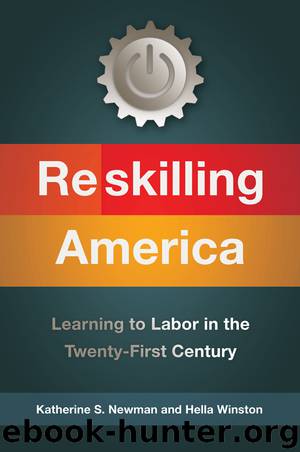Reskilling America by Katherine S. Newman

Author:Katherine S. Newman
Language: eng
Format: epub
ISBN: 9781627793292
Publisher: Henry Holt and Company
7
The Math Puzzle
From Andrew Hacker in the New York Times, July 29, 2012:
A typical American school day finds some six million high school students and two million college freshmen struggling with algebra. In both high school and college, all too many students are expected to fail. Why do we subject American students to this ordeal? I’ve found myself moving toward the strong view that we shouldn’t.
My question extends beyond algebra and applies more broadly to the usual mathematics sequence, from geometry through calculus. State regents and legislators—and much of the public—take it as self-evident that every young person should be made to master polynomial functions and parametric equations.
There are many defenses of algebra and the virtue of learning it. Most of them sound reasonable on first hearing; many of them I once accepted. But the more I examine them, the clearer it seems that they are largely or wholly wrong—unsupported by research or evidence, or based on wishful logic. (I’m not talking about quantitative skills, critical for informed citizenship and personal finance, but a very different ballgame.)
This debate matters. Making mathematics mandatory prevents us from discovering and developing young talent. In the interest of maintaining rigor, we’re actually depleting our pool of brainpower.1
Andrew Hacker’s broadside against the gatekeeping functions of the mathematics curriculum is a response to the anxieties that underlie the “college for all” movement. The rationale for the current curriculum is that all students need to understand pure math—rather than the application of mathematical ideas for real-world problem solving—because it is a fundamental form of knowledge. Without this mastery, students will be unable to function in modern society. Hence the traditional mathematics sequence should be required for high-school graduation and augmented by additional requirements in the early years of college.
The federal government’s Common Core initiative is based on this premise. Its advocates believe that a rigorous high-school education, especially in math, will ensure that American students will be able to head for higher education if they want to, but will also equip them if they want to enter the job market immediately.2 But, as Hacker notes, the evidence for this position is as limited as the conviction about it is strong. The “Survey of Workplace Skills, Technology, and Management Practices (STAMP),” funded by, among others, the National Science Foundation, makes clear that only a very small number of occupations make use of any mathematics beyond what most of us learn in the first few years of high school:
Nearly all workers use some math and 68 percent use fractions, but less than one in four uses anything more advanced than fractions. Only 19 percent use the skills developed in Algebra I and only 9 percent use the skills for Algebra II. Even among upper white-collar workers, professionals and managers, the use of middle to upper level high school math is strikingly low. Only 14 percent of these managerial, professional or technical workers report using Algebra II and only 22 percent report using statistics. The share using these math tools among workers in all other job categories is generally in the single digits.
Download
This site does not store any files on its server. We only index and link to content provided by other sites. Please contact the content providers to delete copyright contents if any and email us, we'll remove relevant links or contents immediately.
The Secret History by Donna Tartt(16623)
The Social Justice Warrior Handbook by Lisa De Pasquale(11489)
Thirteen Reasons Why by Jay Asher(7788)
This Is How You Lose Her by Junot Diaz(5772)
Weapons of Math Destruction by Cathy O'Neil(5036)
Zero to One by Peter Thiel(4824)
The Myth of the Strong Leader by Archie Brown(4789)
Promise Me, Dad by Joe Biden(4447)
Beartown by Fredrik Backman(4418)
Stone's Rules by Roger Stone(4415)
How Democracies Die by Steven Levitsky & Daniel Ziblatt(4398)
The Fire Next Time by James Baldwin(4342)
100 Deadly Skills by Clint Emerson(4077)
A Higher Loyalty: Truth, Lies, and Leadership by James Comey(4032)
Rise and Kill First by Ronen Bergman(4012)
The David Icke Guide to the Global Conspiracy (and how to end it) by David Icke(3881)
The Farm by Tom Rob Smith(3872)
Secrecy World by Jake Bernstein(3782)
The Doomsday Machine by Daniel Ellsberg(3731)
